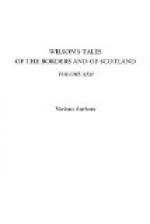At length I reached the Moated Grange, on a visit to my friend Graeme. But since I am to speak a good deal of this place, I may as well explain that it was misnamed. There was no moat, nor had there been for a hundred years; but round the old pile—hoary, and shrivelled, and palsied enough, in all conscience, for delighting the mole-eye of any antiquarian hunks—– there was a visible trace of the old ditch in a hollow covered with green sward going all round the house, which hollow was the only place clear of trees. And these trees! They stood for a mile round, like an army of giants seventy feet high, all intent, it would seem, upon choking the poor old pile, throwing their big arms over the hollow, swinging them to and fro, and dashing their points against the panes as the wind listed. It would come by-and-by to be a hard task for the stone and lime victim to hold its place, with its sinews of run mortar, against these tyrants of the wood. And then they were as full of noises as Babel itself—noises a thousand times more heterogeneous—croaking, chirping, screeching, cawing, whistling, billing, cooing, cuckooing. “What a place to live in!” I thought, fresh as I was from town, “where, if there are noises, one knows something of their meaning—maledictory, yea, devilish as it often is, expressive of the passions of men which will never sleep. But these! what could one make of such a tintamarre? Nothing but the reflection—that is, if you happen to be a philosopher, which, thank God, I am not—that not one note of all this rural oratorio is without its intention; and thus we always satisfy ourselves. But when we run the matter up a little further, we find it a very small affair: two responses, one to each of two chords vibrating for ever and ever throughout all nature—pleasure and pain, pain and pleasure, turn by turn—the last pain being death!”
“How can you live here, Graeme?” I said, as we stood under the old porch, looking out, or rather having our look blocked up by the thickness, and our ears deaved by the eternal screeching and cawing of five thousand crows overhead.
“There’s gloom everywhere where man is,” he replied, “and screeching owls in every brain. You can’t get quit.” Then, lowering his voice, “I am haunted, and yet live here in this Moated Grange! The difference is this: in the town the gaslight and eternal clatter distract a man like me who is plagued from within; here I find some concord between the inside and the out, only the owls in the inside are more grotesque and horrible.”
“Well, Graeme,” said I, “it is needless to disguise what brought me here. The secret is out. The choke-damp has got wind. If the idiot had not blown his brains out, it would have been nothing. You could have paid him back, and he might now have had both his money and his brains.”
“Got wind!” cried he, clutching me by the breast of the coat with the fury of a highwayman or a spasmodic actor. “Did the villain Ruggieri tell you?”




